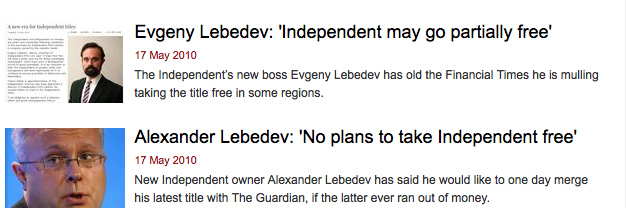Kelvin MacKenzie’s rubbishing of journalism courses has sparked a heated debate across numerous websites.
“There’s nothing you can learn in three years studying media at university that you can’t learn in just one month on a local paper,” he wrote in today’s Independent, saying he would shut down the colleges.
This post on Wannabe Hacks gives four reasons why MacKenzie is wrong and makes this interesting observation of why the former Sun editor – who has only one O-level – ended up in journalism.
This is key for me: the fact Mr MacKenzie had no choice but to scrap at a local paper when he was 16. He had few prospects and no options beyond an early entrance to the newsroom. But when you have the chance to go to uni or do a postgrad course, I think it’s natural to want to do so and to push yourself academically. It’s not for everyone and the jury’s out as to whether courses do you good. But let’s not take advice from a man who didn’t have a choice.
Over on Jon Slattery’s blog, he points out it is not the correct climate for newspapers to take on trainees.
The trouble with the local press route into journalism is how are regional newspapers going to take on trainees when they are cutting staff? Look at today’s news. Midland News Association, publisher of Britain’s biggest selling regional, the Wolverhampton-based Express & Star, is planning 90 [95] redundancies.
The National Council for the Training of Journalists agrees. HoldtheFrontPage has this interview with the chief executive of the NCTJ, Joanne Butcher.
She said: “Kelvin MacKenzie, of course, exaggerates to make some valid points about media degree courses and the value of learning the journalist’s craft by cutting your teeth on a local paper.
“But he does seem stuck in a time warp. Unlike when Kelvin trained on the South East London Mercury and was sent away to college, newspapers simply don’t take on many raw recruits these days.
In this post, a journalism student from University of Central Lancashire, Wordsmith, also argues the difficulties in being accepted on a paper directly from school.
On papers you don’t have time to fail, because of the pressure on you and the hundreds of people waiting to take your job.
A blog post on Rantings of a Sub Editor suggests a non-journalism degree first does help and some training, in a sub’s case the “basics of libel, copyright and privacy law, which are essential, a grounding in public affairs – local and national – and a working knowledge of Quark” and Substuff has some pretty good advice for wannabe journalists too.
Roy Greenslade also believes it is important to get a university education before going on to take a postgraduate journalism training course and, in this blog post, responds to MacKenzie’s jab at Greenslade’s City University lectureship.
I came up by the same route as Kelvin. He is right about it having been a terrific combination of learning-on-the-job and fun. But that was then, and this is now.
A university education is far better for journalists – and for journalism. It sharpens their critical faculties. It provides a great grounding in the basic skills. It is so good that many graduates are able to step straight into national papers.
Over on the Press Gazette blog, Dominic Ponsford argues MacKenzie “has a point about the ballooning cost of journalism training”.
MacKenzie does highlight a looming problem for the journalism industry, and one which it desperately needs to address. On the whole journalists are nowadays expected to fund their own training (the industry used to provide it on the job via block-release schemes). With first degrees costing up to £9,000 a year, and post-grads another £10,000 on top, and with food and board added in, you are looking at spending £50,000 to to bag a job which, in the regional press, offers starting pay of £15,000.
How many aspiring journalists are realistically going to do that?
Journalism.co.uk’s earlier comment post – where you can tell us why you think MacKenzie is right, or wrong.
